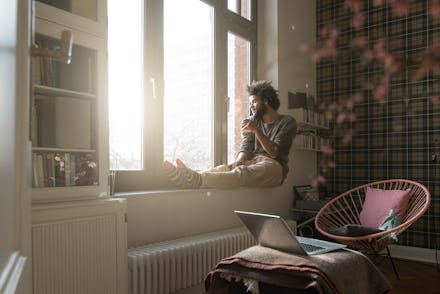Some of us are actually thriving in quarantine

The COVID-19 stay-at-home orders imposed all over the U.S. have provided a jarring new take on life, and they’re affecting each of us in unique ways. Most of us are anxiously awaiting a return to regularly scheduled programming. Curiously enough, there’s a subset of people who’ve found that they’re more relaxed than usual. They’re sleeping better. They like the way their lives are now. They’re happy. It’s like a mega chorus of people singing, “it’s the end of the world as we know it,” and this group is answering back, “and I feel fine.” Yes, some people are happier in quarantine.
“Previous to [lockdown], I had been running myself into the ground every day for about five years, so it feels incredible to have the space to take it slow,” says Melissa Clark, a 35-year-old clothing designer in New Orleans. She explains that this time of year is usually so busy for her that she doesn’t even notice the city’s picturesque transition into spring. This year, she’s revelled in its splendor — safely, of course. She’s spent a lot of quarantine time walking back and forth between her studio and her home, which are a block apart. “Now I see my neighbors every day and that’s great,” Clark says.
It’s not that Clark’s life is perfect. She’s lost income and has no idea when it might return. But she credits her peaceful adaptation to shelter-in-place orders to the implementation of structure that includes getting outside. “I was definitely freaking out the first couple of weeks, but after settling into a routine I feel much better,” Clark says.
Keeping a schedule can help people feel a sense of safety, even amidst wild, dark times like these. “Life can be made quite predictable and our sense of control is enhanced,” says Curtis Reisinger, an NYC-based psychologist and assistant professor at Donald and Barbara Zucker School of Medicine at Hofstra University. “Seclusion and isolation can increase some people’s sense of security. Their time is their own and they own it all.”
For some people, the added agency can be freeing, Reisinger says. These individuals feel happy when they have control over their own time and experience, and a lot of individuals have a lot more control than usual over how they spend their time.
The meaning assigned to seemingly mundane activities makes a big difference in how people feel about their lives. “The choice to pick up groceries versus going inside the store, for example, protects workers from exposure and also supports their jobs and the businesses you shop from right now,” says Stefani Goerlich, a Detroit-based psychotherapist. “Focusing on the beneficial impact of these choices helps build resiliency.” So, for those who are intentionally navigating quarantine, there's a new sense of purpose.
For the first time in many of our lives, we have the opportunity to decide our values without the pressure of being watched.
Letting go of concerns that don’t feel meaningful is another way of finding peace in uncertain times. “So many of our society’s preconceived notions and expectations are clearly meaningless in the face of the abyss,” Nick Conte, a 30-year-old grad student in Salt Lake City, tells Mic. His deadpan humor belies real wisdom. The first few weeks of stay-at-home were hard, but he says that the absurdity of trying to hold on to arbitrary values, like grades, hit him in a revelatory way, and forced him to take stock of his life.
He spent one Sunday afternoon making a list of his own values, and they are helping him structure how he spends his time right now. The anxieties Conte struggled with pre-pandemic, he tells me, were mostly based on trying to adhere to external expectations. Now he’s creating his own.
For the first time in many of our lives, we have the opportunity to decide our values without the pressure of being watched. “I’ve heard folks referring to this time as The Great Pause, a once in a lifetime opportunity to see what it looks like, and how it feels, to opt out of the rat race,” says Goerlich. “We have society’s permission to say no. That experience is something wholly unfamiliar to most of us, and many of us are finding it surprisingly enjoyable.”
We have society’s permission to say no. That experience is something wholly unfamiliar to most of us, and many of us are finding it surprisingly enjoyable.
One of the things Conte has learned he values most, in fact, is mindfulness. “People who are skilled in prayer, meditation, or mindfulness may be quite comfortable in solitude,” Reisinger says. Instead of trying to escape from the discomfort of the moment, people who practice mindfulness are able to accept discomforts as passing moments, Reisinger explains.
Learning to witness our thoughts and feelings with objectivity keeps us aware that current feelings won’t last and gives us time to question the judgements we usually make about our thoughts and where they come from. “You can just watch your own thoughts as an observer. You can learn that even though we are social beings, this is not a mandate of modern society," Reisinger says. "We can live and be alone with no consequence. ... It's a skill, not a disability."